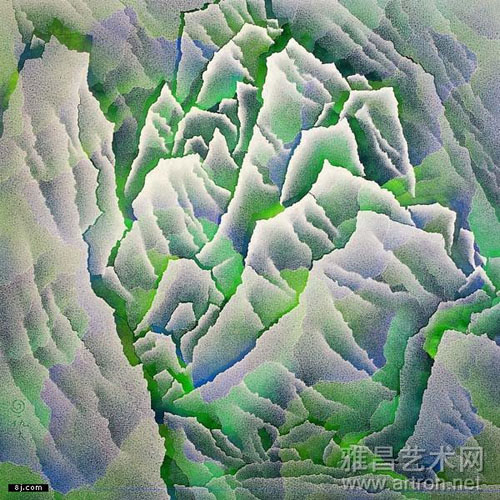
地點: 蕾達(dá)畫廊
區(qū)域: 上海/ 黃浦區(qū)/
標(biāo)簽:
·展覽城市: 上海-上海
·策 展 人: 吳文星
·展覽時間: 2007-03-25~2007-04-15
·開幕酒會: 2007-03-25 15:00——18:00
·展覽地點: 蕾達(dá)畫廊
·聯(lián)系方式: Tel. : +86 21 6277 4131 Fax: +86 21 6266 7958
·備 注: 總監(jiān):Director:Leda 蕾達(dá) 執(zhí)行:項艷 Administration:Xiang Yan 媒體:Angela Media: Angela
展覽前言:
裂變
1979年,對中國來說是一個春意萌動、生趣盎然的一年。就在這一年,一場近代中國思想解放運動正在悄悄地醞釀著。它是中國改革開放這一偉大歷史進(jìn)程奏鳴的序曲,也是為半個多世紀(jì)以來思想禁錮、文化專制時代的結(jié)束敲響的喪鐘。人們欣喜無比,思想活躍,產(chǎn)生出從未有過的對離經(jīng)叛道、探求真理的熱忱。長期以來在中國美術(shù)界所謂“主題先行、講述故事、宣傳思想”的統(tǒng)一格式被打破了,藝術(shù)家們在掙脫了思想的枷鎖之后開始重新審視自己,開始探求各自的藝術(shù)方向。
仇德樹先生無疑是那個萌芽時代的先鋒人物。 1979年10月,由仇先生發(fā)起,經(jīng)十一名青年藝術(shù)家集體倡導(dǎo)、組織的藝術(shù)團(tuán)體“草草社”在上海成立。這標(biāo)志著近百年來中國藝術(shù)家“結(jié)社”傳統(tǒng)在被中斷后的重新開始,也顯示出獲得解放的藝術(shù)家們集體性探求藝術(shù)真理的自覺意識的抬頭。仇先生提出的“獨立精神、獨特技法、獨創(chuàng)風(fēng)格”的觀點得到大家廣泛的認(rèn)同,并成為當(dāng)時美術(shù)界同仁們共同的理想與追求。正是這種獨一無二的精神,使仇先生的藝術(shù)超越了中國畫的傳統(tǒng)性,進(jìn)入了一個嶄新的領(lǐng)域,從而確立了一個新的藝術(shù)形態(tài)——裂變藝術(shù)。這是一種邊構(gòu)畫、邊撕裂、邊整合、邊裝裱的一氣呵成的繪畫方法,通過在宣紙上撕、磨、擦、雕等技法,使宣紙的材質(zhì)獲得了美妙的展現(xiàn)。從構(gòu)圖形式上創(chuàng)造了一種天然成趣、變化自由的繪畫線條——裂紋。從色彩上改變了上色的次序,所有的色彩都作為底色,事先準(zhǔn)備好并通過對上層宣紙的撕裂、雕磨透露的。動感的線條和充滿奇異光感的色彩,表現(xiàn)出一種近景張力與幽深空間的交織共存,閃爍著一種抽象靈變的意趣。這種裂變藝術(shù)徹底打破了“筆墨是中國畫生命”的傳統(tǒng),改變宣紙的被動性和輔助地位,使它的白晰、細(xì)膩、柔韌、半透明、滲水性等特質(zhì)成為展現(xiàn)藝術(shù)魅力的一種方式。
裂變藝術(shù)不僅是一種文化符號,更是一種精神象征。裂變的現(xiàn)象,從細(xì)胞乃至自然萬物 ,一次次的裂變都是對歷史認(rèn)知的繼承與革新。,仇德樹先生正是用他獨特的藝術(shù)語言將心中的人文情懷在其畫中得以體現(xiàn)。仇先生曾說,當(dāng)代藝術(shù)的價值不在于你是用了什么樣的新媒材或新形式,而是在于你對生命和人性的關(guān)注,對過去、現(xiàn)在、以及將來的反省和思考。裂變中蘊藏著藝術(shù)的深邃和無限的生命力;裂變中凸現(xiàn)了藝術(shù)的本質(zhì),生命的希望在絕望中誕生。仇德樹先生的創(chuàng)作以“裂變”為主題,亦是仇先生對自然、人類、文明史的一種密切關(guān)注。靜觀仇先生的作品,我們不單單看見的是仇先生的藝術(shù)追求與人生體驗,更是仇先生對中國畫壇和中國文化發(fā)展史的責(zé)任。
二十七年過去了,仇德樹先生就像一個虔誠執(zhí)著的行者,十年如一日的遵循著“獨立精神、獨特技法、獨創(chuàng)風(fēng)格”的原則,走著屬于自己的藝術(shù)之路。仇先生無疑是中國畫偉大轉(zhuǎn)型過程中的典范,并默默地為中國的文化復(fù)興事業(yè)作出了歷史性的貢獻(xiàn)。(作者 :吳文星, 翻譯 :王萍)
Fissuring
1979 was a year of many changes and new developments for China. It was during this year that modern China began slowly brewing the liberation of ideological emancipation. It was the “sonata” to China’s reformative years and the end to more than half a century of thoughts imprisonment and feudalism. The change brought about joy and burst of new ideas amongst people, never before rebellion and the craze for truth and knowledge. Artist broke free from years of silence and suppression of thoughts and began exploring themselves in search for new directions.
Qiu Deshu was non other than one of these pioneering artists. In October the same year, he gathered eleven young artists and established an art group called “Cao Cao She” in Shanghai, which was literally “Grass Grass Club” in English. This re kindle the lost century old tradition of artist grouping together and the start to a search for new identity as a group with the new found freedom. Qiu’s philosophy of “Self Dependence”, “Unique Skills” and “Distinctive Style” won appraises from his peers. It also became the benchmark and dream for many aspiring artists. This unique value and belief drove Qiu to transcend the traditional Chinese art and paintings, creating his very own style – “The art of Fissuring”.
Fissuring is a special type of technique that combines tearing, rubbing, scratching and carving on the xuan paper to transform the original material into an astonishing art piece. The composition of the picture is achieved though the natural transformation and creation of cracks on the paper called “Fissure”. Selected colors are applied as the base with xuan paper over, defying the usual sequence of color application in any other art form. The techniques mentioned above are then used to reveal the beautiful colors underneath. The dynamic lines and mystic colors are a perfect harmony of texture and serenity, giving rise to a new form of abstract art. White, fine, soft, sheer and ability to absorb water are the unique qualities of the xuan paper. Qiu fully maximizes these traits to the fullest resulting in a new way of presenting art to the public, breaking free from the conventional way of using just ink in Chinese arts.
The art of fissuring is not just a cultural icon, but also represents a form of spirit; every crack signifies the extension of history and its changes. Using this unique technique, Qiu exemplify his understanding of human feelings through his art works. He once said, “The value of modern artists is not about what new materials or techniques he or she uses, it is about how much he or she knows about life and human nature, how much he or she cares about the past, present and the future.”
Fissuring is a profound art full of life; the cracks reveal the intrinsic quality of art, unveiling new hope from desolation. Qiu’s creations fully demonstrate his interest in the complex nature of the human and civilization. His works not only illustrate his passion for art and life, but also portray his responsibility to the development of the art scene and culture in China.
27 years has passed, Qiu has stayed devoted and consistent to his preaching of– “Self dependence”, “Unique Skills” and “Distinctive Style”, creating his very own panache and direction. Qiu speaks for China’s changing art scenes and played a vital role in reviving China’s art culture. (Text by WU Wenxing, free translation by Angela ONG)